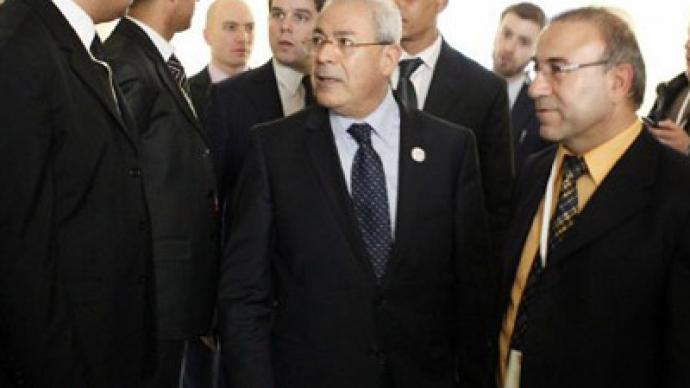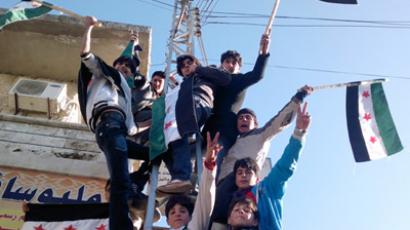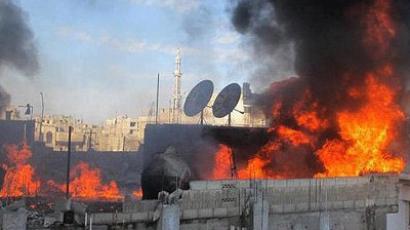SNC ‘halfway to recognition’ by Friends of Syria

The Friends of Syria meeting in Tunisia has gone halfway to recognizing the Syria’s opposition umbrella group the National Council as legitimate representatives of the Syrian people. And promised more pressure and sanctions on the existing regime.
The Syrian National Council (SNC) was recognized as a legitimate representative of the Syrian people, although not the sole representative.Other representatives of increasingly fragmented Syrian opposition groups were invited, including the Damascus-based National Coordination Committee. The NCC boycotted the meeting because it would not rule out the idea of military intervention.But the Tunisian foreign minister, who chaired the conference, promised Western and Arab powers will probably fully recognize the Syrian National Council during the next meeting of the Friends of Syria group in Turkey. "We have gone half the way and we will probably do the other half in Turkey,"stressed Rafik Abdessalem.The conference called for an immediate end to violence and promised more sanctions on the regime of President Assad. It urged t'o allow free and unimpeded access by the UN and humanitarian agencies,” a final declaration issued by the group said. However the meeting’s final document did not recommend military intervention or arming the rebels, both of which actions were called for by the Syrian opposition and some other countries.The SNC has called on the international community to arm the rebels. "The Friends of Syria should not constrain individual countries from aiding the Syrian opposition by means of military advisers, training and provision of arms to defend themselves,"the group said in a seven-point statement of demands.But many Arab states which traditionally have had friendly ties with President Bashar Assad’s administration feel that further militarizing the crisis would tip Syria into a dangerous sectarian quagmire that could destabilize the whole region.This left the Syrian opposition disappointed with its chief, Burhan Ghalioun, saying"This conference does not meet the aspirations of the Syrian people,"Reuters reports.The Saudi foreign minister went further than others during the meeting by calling it"an excellent idea" for weapons and ammunition to be sent to the opposition, including the Free Syrian Army. Meanwhile, Qatari Foreign Minister Sheikh Hamad bin Jassim Al-Thani called for intervention. "There is a need to create an Arab force and open humanitarian corridors to provide security to the Syrian people,"he said.The Friends of Syria also committed to ratchet up sanctions on Syria. These would include travel bans on senior Syrian officials, freezing their assets, boycotting Syrian oil, suspending investments and preventing arms supplies to the government.France added that the European Union would on Monday freeze assets of Syria's national bank held in EU jurisdictions while US Secretary of State Hillary Clinton vowed that already tough US penalties would be strengthened.Following the meeting, Clinton slammed Russia and China for their opposition to UN Security Council action on Syria, calling it“despicable.” Russia and China boycotted the Friends of Syria conference saying it was biased in favor of regime change in Syria. Moscow and Beijing insist that pressure should be also put on the armed opposition.Meanwhile, US President Barack Obama issued his most forceful comment to date on the Syrian crisis saying the US and its allies would use“every tool available”to end the violence. "We're going to continue to keep the pressure up and look for every tool available to prevent the slaughter of innocents in Syria,"he told reporters at the White House.
‘Only political solution will resolve Syrian crisis’ – UN chief
The UN chief underlined that only a political solution will solve the crisis in the country.“The crisis in Syria did not start with calls for regime change,” UN head Ban Ki-moon pointed out. “People wanted reform and an end to oppression, exclusion and marginalization.”Ban addressed the conference held in the Tunisian capital in a message delivered by Lynn Pascoe, the under secretary general for political affairs on Friday.“It is essential to avoid further militarization and a descent towards sectarian strife,” he said.Ban Ki-moon also stressed that the UN’s guiding principles are non-violence, national ownership, democracy, respect for human rights, accountability, impartiality and the independence of humanitarian assistance.“I expect the international community to act in a coherent and consistent manner to facilitate a peaceful resolution of the crisis.”
The conference in Tunis was not legitimate as the Syrian government was not involved, Abayomi Azikiwe, editor of the Pan-African News Wire, told RT. “They are not interested in a peace settlement; they are mainly interested in regime change in Syria.”Azikiwe also believes that the US and the UK are behind Saudi Arabia’s stance on arming the rebels. “The United States and Britain actually want the government in Syria overthrown as a precursory for further aggressive and hostile actions against the Islamic Republic of Iran.”













